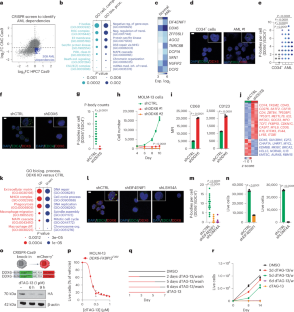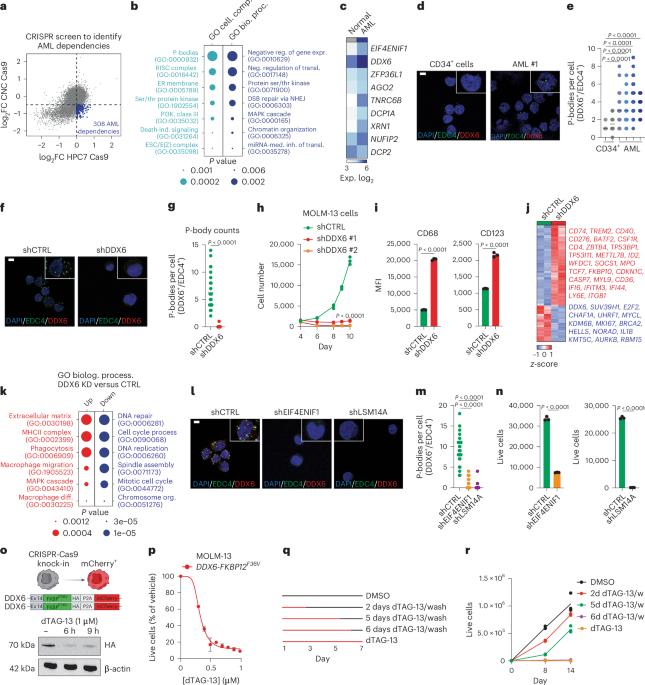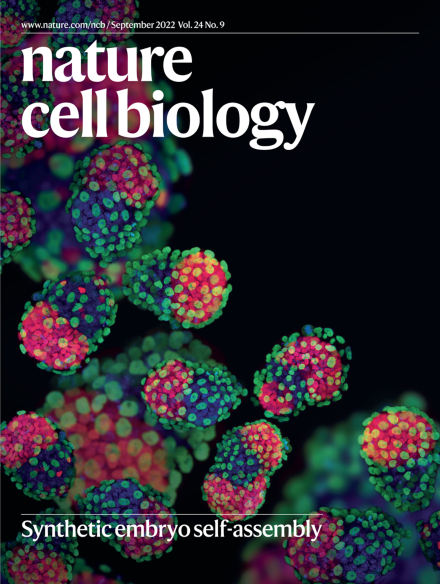RNA sequestration in P-bodies sustains myeloid leukaemia
IF 17.3
1区 生物学
Q1 CELL BIOLOGY
引用次数: 0
Abstract
Post-transcriptional mechanisms are fundamental safeguards of progenitor cell identity and are often dysregulated in cancer. Here, we identified regulators of P-bodies as crucial vulnerabilities in acute myeloid leukaemia (AML) through genome-wide CRISPR screens in normal and malignant haematopoietic progenitors. We found that leukaemia cells harbour aberrantly elevated numbers of P-bodies and show that P-body assembly is crucial for initiation and maintenance of AML. Notably, P-body loss had little effect upon homoeostatic haematopoiesis but impacted regenerative haematopoiesis. Molecular characterization of P-bodies purified from human AML cells unveiled their critical role in sequestering messenger RNAs encoding potent tumour suppressors from the translational machinery. P-body dissolution promoted translation of these mRNAs, which in turn rewired gene expression and chromatin architecture in leukaemia cells. Collectively, our findings highlight the contrasting and unique roles of RNA sequestration in P-bodies during tissue homoeostasis and oncogenesis. These insights open potential avenues for understanding myeloid leukaemia and future therapeutic interventions. Kodali, Proietti et al. report that increased numbers of P-bodies in leukaemia cells account for sequestration and prevention of tumour-suppressive mRNAs from being translated, which could be targeted as a potential intervention in myeloid leukaemia.


P 型体中的 RNA 封存使髓性白血病得以持续
转录后机制是祖细胞特性的基本保障,在癌症中往往会出现失调。在这里,我们通过在正常和恶性造血祖细胞中进行全基因组 CRISPR 筛选,确定了 P-抗体的调控因子是急性髓性白血病(AML)的关键漏洞。我们发现白血病细胞中的 P 型体数量异常增多,并表明 P 型体的组装对急性髓性白血病的发生和维持至关重要。值得注意的是,P-抗体的缺失对同源造血几乎没有影响,但会影响再生造血。从人类急性髓细胞性白血病细胞中纯化的 P-体的分子特征揭示了它们在从翻译机制中封存编码强效肿瘤抑制因子的信使 RNA 方面的关键作用。P 型体的溶解促进了这些 mRNA 的翻译,进而重新连接了白血病细胞中的基因表达和染色质结构。总之,我们的研究结果凸显了在组织稳态和肿瘤发生过程中,RNA在P体中的螯合作用具有鲜明的对比性和独特性。这些见解为了解骨髓性白血病和未来的治疗干预开辟了潜在的途径。
本文章由计算机程序翻译,如有差异,请以英文原文为准。
求助全文
约1分钟内获得全文
求助全文
来源期刊

Nature Cell Biology
生物-细胞生物学
CiteScore
28.40
自引率
0.90%
发文量
219
审稿时长
3 months
期刊介绍:
Nature Cell Biology, a prestigious journal, upholds a commitment to publishing papers of the highest quality across all areas of cell biology, with a particular focus on elucidating mechanisms underlying fundamental cell biological processes. The journal's broad scope encompasses various areas of interest, including but not limited to:
-Autophagy
-Cancer biology
-Cell adhesion and migration
-Cell cycle and growth
-Cell death
-Chromatin and epigenetics
-Cytoskeletal dynamics
-Developmental biology
-DNA replication and repair
-Mechanisms of human disease
-Mechanobiology
-Membrane traffic and dynamics
-Metabolism
-Nuclear organization and dynamics
-Organelle biology
-Proteolysis and quality control
-RNA biology
-Signal transduction
-Stem cell biology
 求助内容:
求助内容: 应助结果提醒方式:
应助结果提醒方式:


